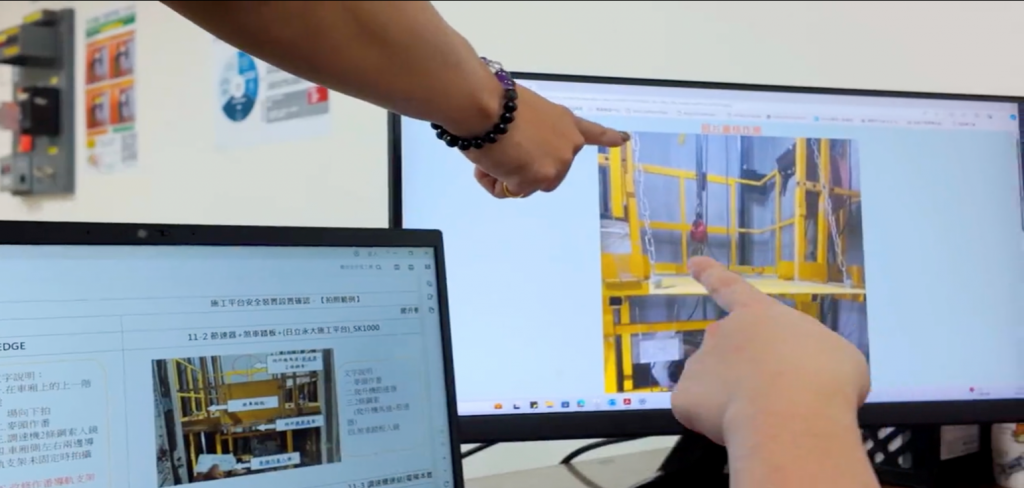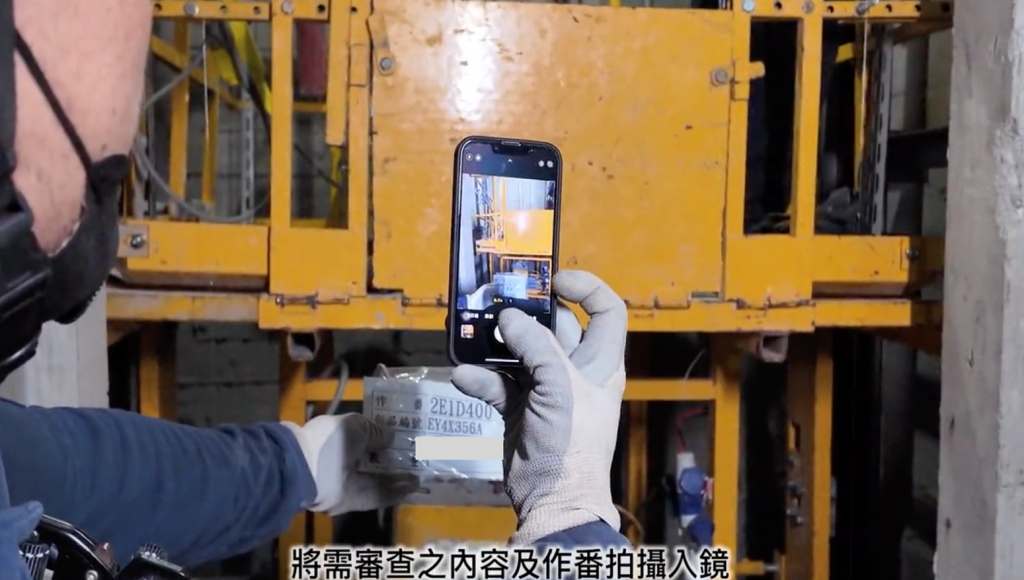Hitachi Yungtay Elevator has implemented the RA-KY system, requiring two-person teams to perform point-and-call safety checks and on-site risk reminders before operations. This approach fosters a standardized and institutionalized safety culture.
Since 2020, Hitachi Yungtay Elevator has invested heavily to become an industry first to fully adopt the Japanese RA-KY safety management system. By integrating digitalized workplace management, establishing the Safety Control Center (CCP), and introducing virtual reality (VR) training to simulate various risk scenarios, the company has successfully reduced occupational incidents by 86% in four years and achieved zero accidents, setting a benchmark for safety management in Taiwan’s elevator industry.
Hitachi Yungtay Elevator stated that the company adheres to the Group’s fundamental principle of placing “safety and health” as the top priority, following the operational guideline of the Hitachi Urban System Business Unit — S (Safety) >> L (Legal) >> Q (Quality) > D (Delivery) > C (Cost). With three major safety mechanisms and three innovative safety tools as the core, the company actively invests in safety management and continues to promote safety awareness. The company’s philosophy is realized through six key dimensions: RA-KY, the CCP Safety Control Center, on-site inspection mechanisms, AI-based identification of personal protective equipment, VR immersive training, and safety protection enhancements.
Hitachi Yungtay Elevator explained that RA-KY stands for “Risk Assessment (RA)” and “Kiken Yochi (KY)” (meaning hazard protection in Japanese), a safety practice developed in Japan through decades of field experience. Since 2020, Hitachi Yungtay has gradually implemented RA-KY and fully rolled it out in Taiwan by 2023. Frontline engineers are required to complete self-health checks and conduct risk and hazard assessments before work every morning and afternoon to ensure complete operational safety.
The CCP Safety Control Center ensures workplace safety by monitoring compliance in real time. To address on-site risks such as falls, entanglement, and electric shocks, engineers are required to submit photos of key safety checkpoints related to the work environment and equipment. The images are then sent to the Control Center for real-time verification before the next phase of work can proceed. Through digitalization of real-time transmission and centralized management, the efficiency of safety inspections and the accuracy of on-site operation have been significantly improved.
The on-site inspection system ensures the implementation of safety measures, with senior executives conducting monthly site visits and over 100 responsible safety supervisors carrying out random inspections. These ongoing audits—resulting in tens of thousands of inspection records annually—continuously remind employees of workplace risks, making safety awareness an integral part of daily operations.
As an industry pioneer, Hitachi Yungtay Elevator has introduced AI real-time recognition technology to automatically detect whether engineers are properly equipped with personal protective gear, such as helmets and safety harnesses, before entering worksites. The company plans to expand AI applications to cover more safety checkpoints in the future.
To further enhance risk awareness and response capability, the company has actively deployed a VR training system, allowing engineers to experience immersive simulations of common accident scenarios such as falls, falling objects, and entrapment, helping them to rehearse risk responses in advance.
For high-risk machine-room-less construction platforms, the company plans to adopt dual-motor construction platforms to replace traditional single-motor designs, preventing falls caused by equipment failure and enhancing safety protection. The company is also evaluating wearable image recognition technology, which can provide real-time reminders of operational precautions and potential risks, strengthening safety awareness and on-site protection.
Since 2021, the company has collaborated with the government to promote the “Safety Family” initiative, inviting subcontractors to participate in safety education and improvement programs. Over the past three years, 12 events and 20 hours of training have been held, helping more than 60 participants obtain professional safety certifications. At the same time, in alignment with the Ministry of Labor’s revised “Guidelines for Work Suspension and Resumption”, the company has optimized on-site reporting and auditing procedures to effectively reduce suspension risks caused by improper operations and ensure every piece of equipment is completed in a zero-accident environment.
In an era where digital transformation advances alongside high-risk industries, Hitachi Yungtay Elevator integrates innovative technology with practical management to achieve its vision of “zero occupational incidents.” In 2023, the company was recognized with the National Occupational Safety Award, demonstrating its long-term commitment to safety management and corporate social responsibility.

The CCP Control Center analyzes construction site risks point by point through visuals, complemented by discussions following the hazard prediction (Kiken Yochi) process within the RA-KY system, ensuring preemptive risk elimination and operational safety.

Before commencing operations, on-site engineers use mobile devices to photograph equipment conditions and instantly transmit the images to the CCP Control Center. This real-time digital monitoring and dual-verification process enhances overall safety audit efficiency.

